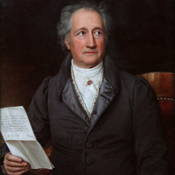
By Joseph Karl Stieler - Public Domain
Johann Wolfgang von Goethe
Playwright
Biography
Johann Wolfgang von Goethe
Considered the greatest figure in German literature in the modern era, Johann Wolfgang von Goethe's writings have become synonymous with the Romantic movement in Europe. Born into the German bourgeoisie in Frankfurt, Goethe's comfortable life definitely influenced his writing, and the security it offered gave him the foundation in which to carry out his studies and begin his writings.
As a young man, Goethe's education led him on a path into studying law, and for a while he left his lofty literary ideas behind, favoring pastoral dramas and racy poetry. The law degree remained unfinished, however, when Goethe suffered heartbreak and rejection, a bout of tuburculosis, and an emotional breakdown. He returned home, where he underwent a radical conversion as an evangelical Christian. Out of this came more writing, and the first strains of Faust.
Goethe's writings include novels, stories, plays, and poems. His epic poem Faust is considered as brilliant and influential as Milton's Paradise Lost or Dante's Inferno. Many of his works have been adapted for stage performances, including more than 10 different operas based on Faust, and his ideals and concepts have been drawn on by many philosophers.
As well as writing, Goethe worked as a statesman, a scientist, a theatre critic and director, and enjoyed creating art in his spare time.
Shows
Shows associated with Johann Wolfgang von Goethe
Monologues
Monologues from shows associated with Johann Wolfgang von Goethe
Songs
Songs from shows associated with Johann Wolfgang von Goethe
Scenes
Scenes from shows associated with Johann Wolfgang von Goethe
Videos
Videos associated with Johann Wolfgang von Goethe
Quizzes
Quizzes associated with Johann Wolfgang von Goethe
Learning Modules
Learning modules associated with Johann Wolfgang von Goethe
Additional Information
N/A